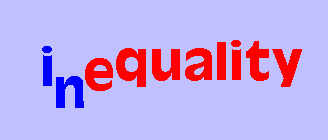Baltimore IMC : http://www.baltimoreimc.org
News :: International Relations
Inequality - Harmful For The Economy
Lately, we have experienced increased economic gaps within many countries as well as between countries. There is reason to claim this: increasing economic inequality means stealing from the poor and giving to the rich. There are also indications suggesting that it means throwing part of the loot into the river, before giving the rest away to those who need it the least. For those in doubt, check out inequality.cjb.net

Lately, we have experienced increased economic gaps within many countries as well as between countries. There is reason to claim this: increasing economic inequality means stealing from the poor and giving to the rich.There are also indications suggesting that it means throwing part of the loot into the river, before giving the rest away to those who need it the least. |
The following should not be seen as supportive to the World Bank's practical policies. As we all know, action speaks louder than words.
READ MORE AT inequality.cjb.net
Views
Information
Search
This site made manifest by dadaIMC software
